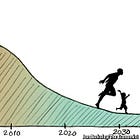Jesus is a Capitalist
The entirety of Scripture not only assumes but establishes private property rights, in minute detail.
by Rod D. Martin
March 29, 2021
Jesus is a Capitalist.
Yes, this will come as a shock to your gender studies professor, your hippie uncle, and perhaps even your (non-economically trained) pastor. But it's true.
The entirety of Scripture not only assumes but establishes private property rights, in minute detail. Even at the macro, Ten Commandments level, not only is theft prohibited, but even just thinking about theft (covetousness) is also.
Moreover, the Bible's sole nationalization of a private business -- Ahab and Jezebel seizing Naboth's vineyard -- is portrayed as wicked, not as "social justice". The enslavement of the pagan Egyptians is exactly that -- enslavement -- and leads ultimately to their destruction.
Indeed, it is Paul's illustration of the different parts in the Body of Christ, and God's repeated assertion that those parts -- us -- are differently gifted, which forms the basis of the breakthrough concept of the Division of Labor, the basis of not only the Industrial Revolution but of the unprecedented hockey stick spike in global living standards since the 18th Century. Then, as had been true for millennia before, 94% of the world's population lived in extreme poverty (less than a dollar a day in current dollars); in the comparatively brief time since, that percentage has almost flipped.
From the Creation Mandate to Proverbs 31 to the Parable of the Talents, Scripture encourages thrift, investment, entrepreneurship and the multiplication of capital. Nowhere does it suggest equality of outcomes, not even in Heaven.
And while the Word counsels a meaningful but limited obedience to government in Romans 13, it also limits that government, most obviously in the Apostles' rebuke to the Sanhedrin ("We must obey God rather than men") in Acts 5, but perhaps most remarkably in 1st Samuel 8, where even a tax "as much as the tithe" (or 10%) is classified as tyranny.
This is intentional, and extraordinary, on God’s part. While individual wealthy people might and will act sinfully, the concentration of most or all assets in the state results in the state’s deification: it becomes the dispenser of all blessings and curses, and as its absolute power corrupts it absolutely, it acts with the aspirations to godhood God shows us in Nimrod, Pharaoh and Caesar.
Moreover, the positive impact of private property is extraordinary. In Capitalism, no man may get ahead except by solving other people’s problems, better and more cheaply than others. Indeed, the market incentivizes even the basest and greediest of men to seek out those other people’s problems, and expend their own time and treasure to creatively solve them, all while requiring no one to accept their proposed solution. Buggies were good, cars were better, with different kinds for every need.
The system of private property and competitive markets makes following the Golden Rule, something the sin nature resists, profitable. It causes society to abandon force in favor of persuasion. It harnesses the strong to serve the weak, the precise opposite of top-down Socialism.
Capitalism is the systemic implementation of the Creation Mandate and the Second Greatest Commandment, no matter how much it is abused by sinners. And no matter how adorned by good intentions, Socialism is the systemic violation of the 8th and 10th Commandments, if not all the rest.
Don't pretend Christ has no opinion on economic matters. Christ, the Creator of all things, the incarnate Word Who breathed all Scripture, has told us His opinion from Genesis to Revelation.
Too many among us just like maintaining enough wiggle room to envy and steal, individually or through the State.
-- Jesus is a Capitalist originally appeared as a Facebook post by Rod D. Martin.







I'm curious- in what way does a free market (especially in contrast to a slave market, with all manner of regulations and 3rd-parties deciding who pays what and who charged what) contradict anything in the scope of biblical revelation?
To suggest Jesus is a Capitalist is to try to shoehorn Jesus into a system that, while good, is not perfect. No man-made system is perfect, although obviously some are much better than others. I acknowledge that there are many passages that affirm principles that capitalism includes. But I seriously doubt that in eternity, the system that will oversee our efforts will be capitalism - given one of the key attributes of capitalism is to make a profit. Yes, in this broken world of ours capitalism has led to much good, but it has also yielded a lot of awful results as well. And I share all this as someone who was a capitalist throughout five decades and who benefited greatly from capitalism.